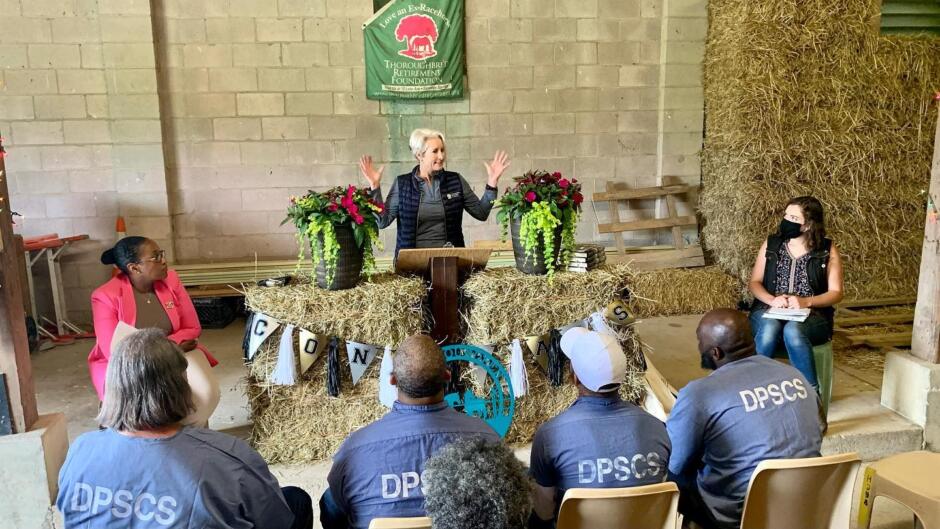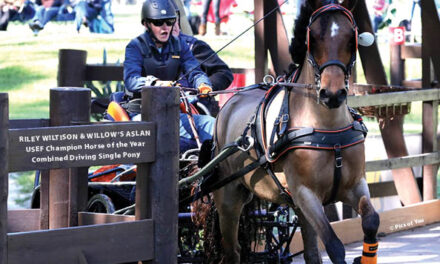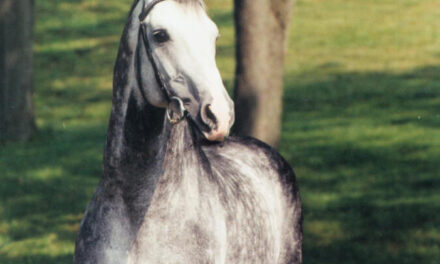by Kimberly K. Egan (first published in the July 2022 Equiery)
The July 2022 issue of The Equiery contains a feature about labor issues that affect the horse industry. We can tell from our Help Wanted classifieds, which we run on-line, in print, and in the member newsletter, that horse businesses are hiring, and that qualified candidates are hard to find. We need to increase the pool of qualified candidates. MHC member the Thoroughbred Retirement Foundation (TRF) is working to do just that.
On May 26, the TRF’s Second Chances program at the Central Maryland Correctional Facility in Sykesville held its first graduation ceremony since 2019. TRF runs the Second Chances program at nine facilities in eight states. Their website explains that “inmates from every imaginable background take part in a rigorous training program where they learn horse anatomy, how to care for injuries, equine nutrition and other aspects of horse care. Graduates of the program receive a certification based on the level of expertise they have mastered. After their release from prison, graduates of the TRF Second Chances Program have gone on to careers as farriers, vet assistants, and caretakers.”
MHIB Executive Director Ross Peddicord and I attended a recent graduation ceremony on behalf of the Maryland horse industry. It was an astonishing day. Here is the Facebook post that I wrote that night about it.
“I met a guy today who robbed a bank 20 years ago and has been in prison ever since. I met him because he was graduating from a 6 month program that trains prison inmates for jobs in the horse industry. Three other inmates graduated with him but they did not volunteer why they were in prison, and I didn’t ask.
“The men had passed an examination on how to be entry level grooms. They had to draw pictures of the skeletal anatomy of the hind legs and frogs of the hooves. They had to learn about horse nutrition and common pasture injuries. They had to learn basic equine first aid. They built a beautiful round pen. They mowed the fields, and they fed the horses every day. Their horses were spotless.
“Each of these men made a few remarks. One man had never seen a horse before, and said he was afraid to even touch a horse for the first three or four days. One man had to overcome his frustration that his horse — Niles — wouldn’t pick up his feet. Once the man made the conscious decision to change his attitude towards Niles, then Niles rewarded him by picking up his feet almost every time. Thereafter Niles would run straight to this man when they were coming in to eat. The man was over-wrought with emotion about his relationship with this horse.
“The fourth man was terrified to talk. He told us he was extremely nervous. He apologized in advance. Then he made a stunning speech about how he learned to communicate. With an animal. Who didn’t speak English. Who didn’t speak at all. The man said “I learned to speak in another language!” His horse had helped him learn to talk to humans.
“After the graduation I had a fascinating conversation with the prison warden and the deputy secretary of public safety about how to get employers to overcome the stigma of hiring an ex-felon. I was impressed that they were willing to talk about why these men were in prison, how our society had failed them from the beginning, how “we” needed to do everything we can do to help them succeed once they are released because the collective “we” are partly responsible for why they made their mistakes in the first place. I had not expected that from prison officials.
“It was one of the best days I’ve had in recent years.”
N.B. TRF is spearheading an effort to build a Maryland Equine Employment Program. MHC plans to partner with TRF on the project. Watch this space for more details.
Corinne M. Pouliquen and Kimberly K. Egan are the Co-Presidents of the Maryland Horse Council. You can reach Corinne at parkoverlookfarm@aol.com. You can reach Kim at kegan@mdhorsecouncil.org.












